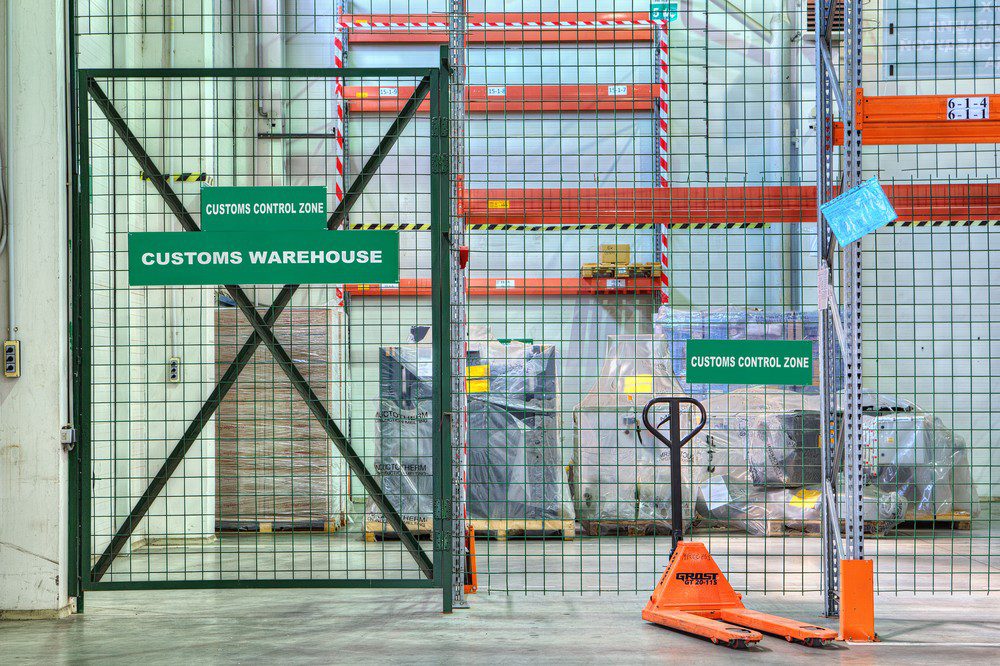Also known as customs warehouses, it’s common for many importers and exporters to use bonded warehouses. Here in the UK, a bonded warehouse is a facility licensed by HMRC to hold dutiable goods until the seller is ready to transport or distribute them elsewhere.
The bonded goods won’t be eligible for customs payments until they enter circulation in the UK market – or not at all, if they leave the facility and the country without entering the market. It’s effectively a kind of authorised customs duty suspension area.
These imported goods are held in bond until either tax duties are paid or they’re exported again without being sold in the UK. This means the owner can store them while they sort out things like packaging, branding, and logistics, without paying customs fees until they’re ready.
Depending on the type of merchandise, you can store bonded goods in such a secure facility for up to 5 years. However, there are some limits on which goods can be stored in bonded warehousing – so let’s look into the what, why, and how of bonded warehouses in the UK.
What is a bonded warehouse and how does it work?
As explained above, a bonded warehousing facility is a kind of government-authorised duty-free zone. When goods are imported into the UK, they can be taken directly to a bonded warehouse from the port of entry, allowing the owner to defer their customs liabilities until a later date.
For this reason, bonded warehouses tend to be located close to major travel links – be it sea ports, airports, motorways, or railways. For example, our John K. Philips bonded warehouse is located between Liverpool and Manchester, with excellent connections to several key transport systems.
There are two types of bonded storage with different restrictions. Wet bonded warehouses can store alcohol and tobacco, while dry bonded warehouses can only store general goods. Certain products, such as those specified in the Common Agricultural Policy, have tighter regulations.
While you can generally store goods in a bonded warehouse for as long as you want to, food and other consumables will be limited by their use-by/expiration dates. Of course, chemicals and other hazardous materials are subject to much stricter import controls. To store them legally and handle them safely, the warehouse-keeper must have the right licenses – which we do at John K. Philips.
Who can use a bonded warehouse and what can they store?
Bonded warehouses can either be private or public. The owner of a private bonded warehouse will be the only person permitted to use it for storing their own goods. Public bonded warehouses, such as the one run by John K. Philips, can be used by any third party with the appropriate permissions.
These third parties, called depositors, can deposit goods coming from outside the EU that are eligible for customs fees, excise duty, or VAT. It’s a helpful holding area if you’re waiting on licences, or supporting documents before further distribution, allowing you to avoid paying taxes upfront.
In some cases, you can store goods from an EU country in a bonded warehouse – for example, if they’re covered by temporary duty suspension, Community Transit, common storage, or export refund laws. Whichever goods you store, they’ll be subject to ‘usual handling’ rules inside – meaning you can only handle them to improve their presentation or prepare them for distribution or sale.
When you choose a bonded warehouse company, you should make sure they have the appropriate facilities for the goods you want to store – such as wet or dry containers, temperature-controlled zones, or freezers. You might also prefer to outsource your HMRC paperwork to the warehouse-keeper so they can take care of it for you, which is a service we also offer here at John K. Philips.
Why are bonded warehouses important for trade?
Facilities like bonded warehouses are vital for supporting international trade. It’s not just a case of storing cargo and putting off tax payments – businesses can better manage their inventory and cash flow, preparing goods and planning for distribution while storing them in a safe and secure place.
⦿ Import duty deferral
Of course, the primary attraction is the ability to defer or avoid customs payments. The breathing room this allows can be invaluable for smaller or newer businesses, as you won’t have to pay duties until you’re ready to release the goods into circulation in the UK.
If you then export the goods for distribution in another market instead, you either won’t have to pay at all, or can claim a refund later. In either case, you’ll have time to organise your cash flow and guarantee income before having to pay customs fees on imports.
⦿ Long-term storage
Another major benefit is the capacity for long-term storage. Your goods can be stored for several years in conditions that preserve their quality. When you’re ready to move them, the bonded warehouse will be close to the ports and freight systems you’ll need for swift transport or delivery.
Additionally, this gives you the opportunity to observe fluctuating markets and exchange rates, and only withdraw and sell your goods when demand is high and prices are favourable. This way, you won’t lose money paying import duties until you’re guaranteed revenue from selling the goods.
⦿ Security and trackability
Bonded warehouse facilities are completely secure, giving you peace of mind that your goods are in safe hands and protected from unauthorised access. No matter the value of your consignment, we provide 24/7 monitoring at the John K. Philips bonded warehouse.
This includes CCTV cameras, regular patrols by security personnel, and alarms. Thanks to our advanced barcoding system, we can also keep track of your goods to the minute, so you’ll know exactly where they are at any time.
⦿ Integrated logistics solutions
While the goods are inside the bonded warehouse, you can also organise your inventory and repackage items as needed (though you cannot manufacture finished goods from raw materials). Once your merchandise is ready for sale, you can even collaborate with the warehouse-keeper on integrated logistics.
In turn, this enables businesses to streamline the distribution of their goods, helping supply chains to run smoothly and keeping customers happy with faster deliveries. As we’re sure you know, efficient services and well-preserved products create returning customers who recommend you to others.
For example, here at John K. Philips we offer additional services such as track and trace, pick, pack, and dispatch, road haulage, pallet delivery, and European delivery services – in any combination you require.
Will bonded warehousing help my business?
Wondering whether bonded warehousing is the right route for your business to go down? Need some more persuading on the advantages of end-to-end storage and logistics management? Then get in touch with the team of experts at John K. Philips today.
Simply fill out our online form or give us a call on 01744 751 000 to discuss your bonded storage needs. Whether you want a complete service package or just one element, we’re happy to help you find the best storage and distribution solutions for your business.
Fully audited and approved by HMRC, you can rest assured that John K. Philips offers a thoroughly compliant and reliable service every time. From processing import paperwork to organising palletised goods, we’re confident in our knowledge and skills – so don’t hesitate to contact us.


